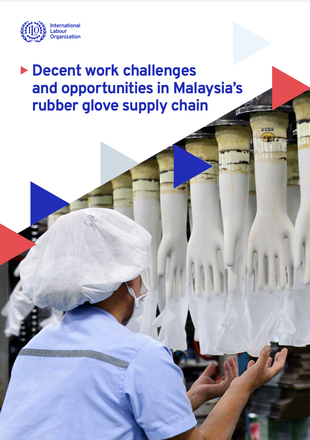Electronics Watch urges against complacency on workers’ rights in Malaysia
A new Report by the ILO about the ongoing forced labour in Malaysia's rubber glove supply chain provides some critical recommendations for governments, manufacturers, buyers, and recruiters as well as workers' organisations and unions.
The letters PPE will long linger as one of the memories of the Covid-19 pandemic, when governments in crisis mode sought, understandably, to procure whatever personal protective equipment they could lay their hands on. But following this clamour for PPE, rubber gloves hit the headlines with a series of shocking stories about these goods from Malaysia: "Exploitation of workers in world's largest glove company", "Overworked staff in Malaysia collapse and have seizures as they make protective equipment" and "US bars rubber gloves from Malaysian firm due to 'evidence of forced labour'".
The Malaysian rubber glove sector employs around 70,000 workers, of which about 60 per cent are migrant workers, mainly from Nepal and Bangladesh.
Electronics Watch acknowledges some positive legislative developments that the ILO highlights in the Report. The Malaysian Government has limited regular working hours to 45 hours per week, extended maternity leave to 98 days, and entitled subcontracted workers to a written contract. However, the Report shows that there are still far too many opportunities for grave exploitation within the Malaysian system. The law still permits up to 12 hours of work a day. Migrant workers can still be charged one month’s salary as a recruitment fee, plus other costs, such as for visas, passports and airfares. And because migrant workers’ migration status is linked to their employment, if they raise a labour grievance with the Department of Labour and their employment is terminated in retaliation, they are then forced to leave Malaysia.
Given the prevalence of forced labour amongst migrant workers in Malaysia, we urge stakeholders to take the ILO’s recommendations seriously, among them:
- Strengthen rights at work, by aligning Malaysian labour laws with international standards and by improving enforcement.
- Strengthen social dialogue, based on respect for freedom of association.
- Promote fair recruitment practices in the sector, including through labour law reform that would prohibit recruiters from charging recruitment fees and costs to workers.
Malaysian human rights organisation - and Electronics Watch Monitoring Partner - Tenaganita adds:
“While endorsing the ILO recommendations, Tenaganita also urges all companies to adopt the UN Guiding Principles on Business and Human Rights. These state that companies should prevent, address and remedy human rights abuses in their business operations. This proactive approach is the only way forward, to ensure that risks of forced labour are systematically eliminated.”
In conclusion, Electronics Watch urges against complacency, as there is clearly still a long way to go before we can be confident that all workers – whether they make rubber gloves or silicon chips – have their rights protected in Malaysian factories.


